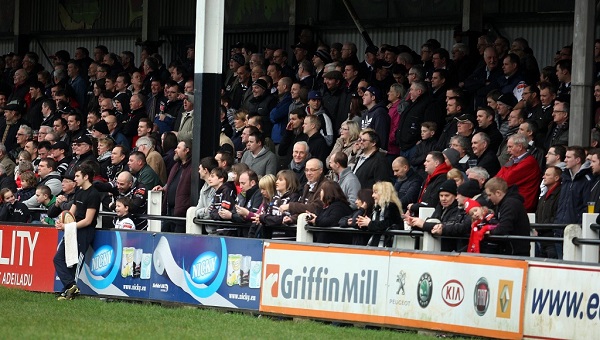 Bevan Foundation
Bevan Foundation 
Every thirty years or so the Co-operative Congress comes to Cardiff.
On 28-30 June the three day event was held at Sophia Gardens, the home of Glamorgan Cricket Club, which is itself an Industrial and Provident Society. The Congress considered a huge range of large issues including housing and social care, as well as smaller examples of co-operative venture, such as the taking over of village pubs, but for me the outstanding session was on sports governance.
The way sports teams are run is an important social and political issue
Against a backdrop of the recent folding of Barry and Llanelli football clubs, and with contrasting models of ownership at Cardiff City and Swansea City, the way that sports teams are run is becoming an increasingly important social and political issue.TV income streams turn traditional football teams into potential global brands and many clubs are now driven by overseas oligarchs or by finance from oil-rich countries and no longer operate in the interest of their fans. The benevolent local business men and women who provided steady and committed leadership to what were local clubs are displaced by sheiks or corporate sharks. A club set up a hundred years ago by local railwaymen might now be owned by Americans and registered in the Cayman Islands….or by a Malaysian billionaire who has only recently discovered football.
Crises have been catalysts for fans’ involvement
Crises in clubs such as Newport County and Wrexham (or Portsmouth and Coventry) have been catalysts for fans’ increased involvement. The presentation by members of Merthyr Town Supporters Trust at Congress about their recent past was enthralling. Their story of frustration with an absentee owner (who was using the club as a business vehicle) and his Board, of the electricity being cut off, and of how the Trust succeeded in replacing the owner with the advice of Supporters Direct, was one of triumph over adversity. The supporters of Merthyr are now engaged in building a stable football club as a community mutual from the youth team up. They are also a source of valuable experience which others in a similar position can call on.
Owen Smith, the MP for Pontypridd spoke about rugby and the divorce that is occurring between grassroots and elite levels. He seemed to gain a lot from listening to the Merthyr experience and referred to the applicability of their approach to the semi-professional rugby game in Wales. As a Shadow Cabinet member Owen spoke of the need for a future Labour Government to shift the balance in sport away from business interests and towards supporters. As sport holds a hugely significant place in the national consciousness such moves could offer a distinctive and relevant way to develop and enhance a progressive political agenda.
Sports clubs are community assets that can be easily overlooked or undervalued.
They can be a generator of economic activity, a vehicle for regeneration, a centre for volunteering, and a glue that helps keep a community together and gives it a key part of its identity.
A few years ago I took one of the Welsh Government’s Directors to a Ponty game who was astonished at the size and involvement of the crowd at the game and commented ‘This is the sort of community spirit and organisation that we had been told had disappeared from the valleys decades ago’. Supporters Trusts in Wrexham and Merthyr have taken over their clubs, returning them to their communities and running them with democratic accountability. Wrexham Supporters Trust’s community share offer seeks to bring economic stability to the club. Swansea City Supporters Trust, which played a key role in saving a failing club from extinction a decade ago and has a member on the club’s Board of Directors, now finds itself owning a 20 per cent stake in a Premier League club, which receives £60 million in TV revenues alone. Their club is a source of pride for the City, pumps money into the local economy and provides it with an international profile. The Swansea example shows that even partial supporter ownership can be valuable in contributing to the running of a club.
The first Co-operative Congress in Cardiff was held in 1900 at a time when the movement began to gain a grip on the economic and social imaginations of the people of Wales. It would have been unimaginable for sport to have been one of the topics of discussion there. However, just as co-operation has grown throughout the twentieth century while constantly changing shape, so too has sport. Sport and co-operation are now being brought together in Britain in ways that have long prevailed elsewhere. In Spain Real Madrid and Barcelona are associations owned by their members – Barcelona alone has 170,000 socios. Most German football teams are required to have a majority shareholding of ordinary members. The structure of the Green Bay Packers of the American Football League, which won the 2011 Super Bowl, is formally ‘a community project, intended to promote community welfare’.
The contradictions between fans’ and owners’ interests are becoming acute at too many clubs.
Whether in Merthyr or Manchester, differences around identity, ethos, ownership and control expose conflicts between corporate and supporters’ interests. Community and co-operative solutions through mass membership, which are being tried in some places as an alternative to narrow ownership structures, offer an alternative for supporters who wish to become engaged in their clubs beyond turning up on Saturdays. It is too early to know how significant this process may become.
However, it is not just on the field that football and rugby promises to be even more interesting in years to come…
Alun Burge is a Trustee of the Bevan Foundation and expert on the history of the co-operative movement.


